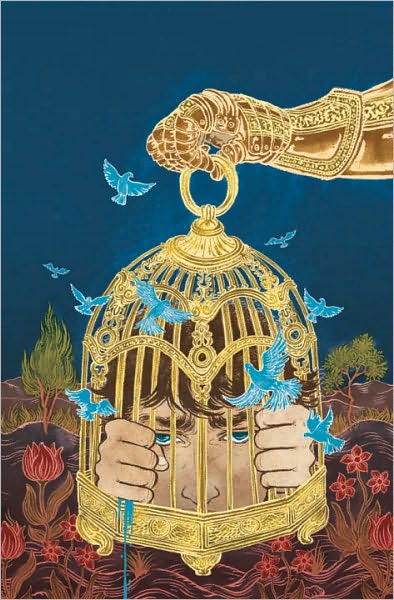My immediate reaction to the second trade collection of The Unwritten was something short and sweet along the lines of hot damn. My second thought was that this Mike Carey & Peter Gross project very well might be the best comic I’ve read since Sandman.
Understand, I’ve loved comics since then—I did the read-along for Transmetropolitan, which is one of my other all-time favorites—but there was something about the way Gaiman put Sandman together that made it an irresistible, perfect match for my reading needs. I’m content with it being my favorite comic. But then this comes along! I’m not going to say so early in the game whether or not Sandman might somehow be de-throned as my favorite, but, well. Carey is really doing something, here.
The first volume of The Unwritten was impressive and skilled, but the second allows the story to truly take wing. Its universe unfolds in a crazy loop of tales and mythologies with a harsh, warping reality behind it all. It’s—you know, I might say beautiful.
To continue the Sandman thread for a moment: the method in which Carey is choosing to build his story is what sells me so thoroughly on this series. It does remind me of Gaiman’s tactics of storytelling because it’s a narrative that bounces between tales and narrators to build a patchwork, kaleidoscope universe. (It’s not as if he isn’t familiar with his effective this technique can be, having written Lucifer.) The story isn’t anchored to Tom/Tommy, despite the fact that he is the “warping factor” or the “hyper-real” image gliding through the other stories, spreading ripples in his wake. His “father,” also, leaves trails that spread as waves through the story.
Then there are the other stories, devoted to the “all stories are true” method and tracing creators, like the final short in the first collection about a few very famous writers. The use of non-linear narrative is a fantastic choice for this story and makes it that much more awesome (and I really mean awesome in the sense of awe-inspiring). The final story in this volume, also, is a short explaining the universe—Mr. Taylor apparently trapped a man named Pauly Bruckner and an associate of his in a popular children’s book as characters, which is notably driving Pauly completely stark raving mad. Watching a soft-painted, children’s-book rabbit shrieking profanity is funny—for a moment. And then the story actually unfolds to the end, and you’re left rather quiet, thinking about the nasty implications of what happens to Mr. Bruckner. I dare you when reading to not be intensely disturbed by the little-girl narrator’s lines, “Nobody ever dies in Willowbank woods. And nothing ever ends.” Eek, eek, eek.
And then, of course, there’s our focal point: Tom Taylor, or, better-known, Tommy Taylor. He’s a kind of pathetic guy, when it comes down to it, the kind you sort of want to kick sometimes. All the same, I find his inability to accept what is happening to him a bit refreshing. After all, it’s the opposite of what the narrative for the hero-tale demands: he’s supposed to accept his magical powers with a thrill and go off to save people and adventure. Instead, he’s in jail for a set of gruesome murders and the rumors and filthy hate spilling around the world about him for it seem to be warping other things everywhere they go. Against his will he’s begun to build his set of companions: Liz, who has all of the keys and clues but can’t tell him what they are (reminds me a bit of the trick in Charles Stross’s The Jennifer Morgue) and the journalist Savoy. The flying cat also deserves a mention.
The Jud Suss section was perhaps my favorite part of the collection because it reveals some of the fantastical, dangerous power Tom/Tommy is wielding without half a clue. The more attention they pay to the ghost-people in the historical narrative, the realer they become—until they can actually kill, or might have been able to. The plot-point of Tom/Tommy “healing” the tangled narrative of the Jud Suss story is, I’m sure, going to come up again with great importance. We as an audience are starting to see pieces of what’s at stake in this world: quite literally everything. Every story, ever reality.
Those are some very, very high stakes. Nothing like high stakes to make a story more gripping.
I haven’t touched on the quality of the writing yet, as I’ve been too busy cooing over the fantastic structural strengths of Carey’s work, but he’s no slouch in the prose department either. His dialogue—not just between characters in the “real” world, but also from the made-up books and universes inside the books, like the world of Willowbank Wood—is always just right. He has a way of choosing words, phrases and constructions that lend themselves to creating multiple realities inside of one reality, each distinguishable from the others. He can write books within books. That is hardly an easy task.
I’ve tried to deconstruct some of the things that make me feel so passionately that this is the best, most interesting comic I’ve read in years, but really, there’s a part of me that just wants to be yelling “Oh god this is so damn good! Buy it! Love it!” It’s not the scholarly part, but I think it’s right, too.
Maybe my weakness for meta is at work here, but I suspect I’m not the only one who will be voting for The Unwritten to win a hundred and one awards from here on out.
(Psst—next year’s Hugo nominations, volume one, yes?)
Lee Mandelo is a multi-fandom geek with a special love for comics and queer literature. She can be found on Twitter and Livejournal.










